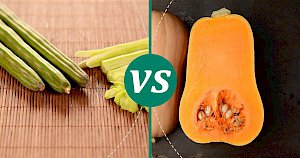Butternut Squash vs Moringa: Nutrition & Calories Compare


Butternut squash vs Moringa
Nutrition Facts
Serving size:
change
5g10g15g20g30g40g50g60g80g100g120g140g160g180g200g220g250g300g350g400g450g500g600g700g800g900g1000g
1oz2oz3oz4oz5oz6oz7oz8oz10oz12oz15oz20oz25oz30oz35oz40oz50oz
Amount Per Serving:
Serving size:
change
5g10g15g20g30g40g50g60g80g100g120g140g160g180g200g220g250g300g350g400g450g500g600g700g800g900g1000g
1oz2oz3oz4oz5oz6oz7oz8oz10oz12oz15oz20oz25oz30oz35oz40oz50oz
Amount Per Serving:
Butternut Squash vs Moringa 100g Compare
| per 100g | Butternut squash | Moringa |
|---|---|---|
| Calories | 45 | 37 |
| Carbohydrates | 11.69 g | 8.53 g |
| Fat | 0.1 g | 0.2 g |
| Dietary fiber | 2 g | 3.2 g |
| Protein | 1 g | 2.1 g |
| Calcium | 48 mg | 30 mg |
| Iron | 0.7 mg | 0.36 mg |
| Magnessium | 34 mg | 45 mg |
| Phosphorus | 33 mg | 50 mg |
| Potassium | 352 mg | 461 mg |
| Sodium | 4 mg | 42 mg |
| Zink | 0.15 mg | 0.45 mg |
| Vitaminium A | 10630 µg | 74 µg |
| Vitaminium B1 (Thiamine) | 0.1 mg | 0.053 mg |
| Vitaminium B2 (riboflavin) | 0.02 mg | 0.074 mg |
| Vitaminium B3 (Niacin) | 1.2 mg | 0.68 mg |
| Vitaminium B6 | 0.154 mg | 0.12 mg |
| Vitaminium B9 (Folic acid) | 27 mg | 44 mg |
| Vitaminium C | 21 mg | 141 mg |
Discovering the Nutritional Gems: Butternut Squash vs. Moringa
When it comes to enriching our diet with vegetables, butternut squash and moringa stand out for their unique benefits and nutritional profiles. Butternut squash, with its sweet, nutty taste, is a favorite fall and winter vegetable, often celebrated for its versatility in soups, roasts, and pies. On the other hand, moringa, known as the "miracle tree," has been used for centuries in traditional medicine, with its leaves packed full of vitamins and minerals.
Butternut Squash: A Fall Favorite
Butternut squash is not only delicious but also packed with a variety of nutrients. It's a fantastic source of vitamin A, with a 100g serving offering a whopping 10,630 IU, primarily in the form of beta-carotene, which the body converts into vitamin A. This makes it excellent for eye health, immune function, and skin integrity. Additionally, butternut squash provides a good amount of fiber, which aids in digestion and helps maintain a healthy weight.
Moringa: The Miracle Tree
Moringa oleifera, often hailed for its health-promoting properties, is rich in vitamins, minerals, and antioxidants. It stands out particularly for its vitamin C content, with a 100g serving providing 141mg, which is more than twice the vitamin C found in oranges. Moringa leaves are also a great source of plant-based protein, making it a popular choice among vegetarians and vegans.
Butternut Squash vs. Moringa: A Nutritional Face-Off
Comparing butternut squash and moringa side by side reveals some interesting facts about their nutritional content. While both are low in calories, with butternut squash containing 45 calories per 100g and moringa only 37, they offer distinct nutritional benefits that cater to different health needs.
- Calories: Butternut squash and moringa are both low-calorie options, making them excellent choices for weight management.
- Carbohydrates and Fiber: Butternut squash has a slightly higher carbohydrate content, but moringa offers more dietary fiber, which is beneficial for digestive health.
- Protein: Moringa outshines butternut squash in protein content, offering 2.1g per 100g, compared to butternut squash's 1g. This makes moringa a valuable protein source for plant-based diets.
- Vitamins and Minerals: Both vegetables are rich in vitamins and minerals, but they excel in different areas. Butternut squash is a superior source of vitamin A, while moringa offers more vitamin C, magnesium, and potassium.
Despite their differences, both butternut squash and moringa are heart-healthy foods with zero cholesterol and minimal fat content. They are also gluten-free, making them suitable for individuals with gluten sensitivities or celiac disease.
Which One to Choose?
Ultimately, the choice between butternut squash and moringa comes down to personal preference and nutritional needs. If you're looking for a vitamin A boost, butternut squash is your go-to. However, if you need to increase your intake of vitamin C or plant-based protein, moringa might be the better option. Why not include both in your diet to reap the full spectrum of their health benefits?
Incorporating a variety of vegetables like butternut squash and moringa into your diet can help ensure you're getting a wide range of nutrients essential for maintaining good health. Whether you choose to roast butternut squash for a comforting autumn dish or sprinkle moringa powder into your morning smoothie, both offer unique flavors and nutritional profiles that can enrich your diet.
Butternut squash 100g
45kcalCalories source
- 91% CARBS.
- 8% PROTEIN
- 2% FAT
Moringa 100g
37kcalCalories source
- 77% CARBS
- 19% PROTEIN
- 4% FAT
Compares of butternut squash
- Butternut Squash vs Artichoke
- Butternut Squash vs Asparagus
- Butternut Squash vs Beetroot
- Butternut Squash vs Calabash
- Butternut Squash vs Broccoli
- Butternut Squash vs Cabbage
- see all compares of butternut squash
Compares of moringa
Read also:
- Calories from Butternut squash
- Calories of Cabbage
- Calories in Carrot
- Cassava calories per 100g
- Cauliflower protein per 100g
- How many calories does fodder cabbage have?
- Calories in a half of eggplant
- Calories in whole eggplant
- Calories for one, two or more eggplants
- Calories in slice of eggplant
- How much protein in endive?
Marcin Piotrowicz
calories-info.com creator
Healthy diet and healthy lifestyle promoter
Add comment